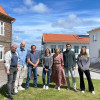Proof-of-concept for seaweed-based feed
The CircleFeed project will demonstrate proof-of-concept for an innovative seaweed-based feed mix that will reduce both the total carbon footprint of feed protein production and enteric methane emission from dairy cattle. The goal is to reduce the greenhouse gas emissions of the total supply chain related to dairy cattle by more than 30%.
Iceland has a unique access to lava filtrated cold arctic seawater and access to sustainable geothermal heat and energy. This is the inspiration behind the company Lava Seaweed ehf, which is a joint venture between Icelandic investors and the Faroese Ocean Rainforest which has long experience in ocean cultivation of kelp species in the North Atlantic and recently also the Northeast Pacific Ocean.
“This is a great opportunity to use sustainable natural resources in Iceland to contribute to solve some of the world’s major food challenges and environmental impact – namely reducing the carbon footprint of producing dairy protein products”
Sigurdur (Siggi) Petursson, CEO and co-founder of Lava Seaweed
Seaweed-based feed to be tested in dairy cows
The CircleFeed is co-funded by Nordic Innovation and has a strong Nordic based consortium spanning the full value chain with cross disciplinary research and industry partners.
One partner in the project is the Icelandic energy company HS Orka and its innovative resource park. CircleFeed will study the feasibility to use access to borehole seawater, geothermal heat, and green energy in land-based farming of red seaweed species. This includes utilisation of the organic waste streams from the fish farming activities in the resource park and use it as a nutrient source of the seaweed farming.
Feed mixtures will be tested in dairy cows (vivo) and artificial cow stomach (vitro) at state-of-the-art facilities at Aarhus University in Denmark, and major Danish cattle feed producer DLG will offer user feedback to further inform product development and market strategies.
The whole supply chain will undergo a life cycle assessment (LCA) performed by The Royal Institute of Technology (KTH) in Sweden, and Sjókovin in the Faroe Islands, will techno-economic feasibility of a scaled production to supply the organic dairy cattle market in Europe and North America.
With use or unique natural resources for land farming of seaweed in Iceland the aim of the Nordic CircleFeed project is to reduce the greenhouse gas emission more than 30% in improved environmental dairy cattle production.






